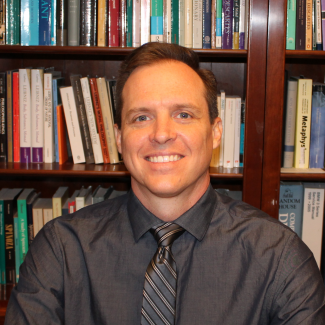Stephen Puryear

he/him/his
Department Head
Professor of Philosophy
Department of Philosophy and Religious Studies
340C Withers Hall
919-515-6103 smpuryear@ncsu.eduBio
A native of Wadesboro, NC, I earned a B.S. in mechanical engineering at NC State in 1994. A circuitous route eventually led me to earn a Ph.D. in philosophy at the University of Pittsburgh in 2006, where I wrote a dissertation on Perception and Representation in Leibniz under the direction of Nicholas Rescher. I then spent two years as an IHUM postdoctoral fellow at Stanford University, after which I returned to NC State as a member of the faculty in 2008.
After five years as a Teaching Assistant Professor, I was appointed as Assistant Professor in 2013. I was then promoted to Associate Professor (w/ tenure) in 2017 and to Professor in 2023. From Summer 2022 to December 2023, I served as Associate Head of the Department of Philosophy and Religious Studies. I then served as Interim Department Head until I was appointed to the role on an ongoing basis in July 2024.
During my time at NC State I have won two teaching awards: the Outstanding Lecturer Award from the College of Humanities and Social Sciences in 2012 and the university-level Outstanding Teacher Award in 2020. With the latter I was also inducted into the NC State Academy of Outstanding Teachers.
Outside of NC State, I have served as president (2019-2023) and secretary-treasurer (2017-2019) of the North Carolina Philosophical Society and as secretary-treasurer (2012-2016) of the Leibniz Society of North America (2012-2016). I currently serve as the vice-president of the LSNA (2024-2028).
I enjoy connecting with current students as well as friends and alumni of the department on LinkedIn.
Professional Activities and Research
I work primarily in the areas of metaphysics and ethics, often through engagement with the German philosophical tradition (especially Leibniz, Kant, and Schopenhauer).
My main project at present is a book on Leibniz’s idealism. Besides that, I continue to work on various topics:
- Schopenhauer’s philosophy, especially his ethics. I am currently editing a Cambridge Critical Guide on Schopenhauer’s Two Fundamental Problems of Ethics, which is due to go to press in late 2026.
- Moral and political philosophy: the nature of obligation, consent, and rights; normative theories; animal ethics.
- Metaphysics: infinity, continuity, space, time, idealism, conceptualism, and monism.
Research Publications
For the full list of my published writings, and links to online versions, please see my PhilPapers profile.
Selected Articles and Chapters
- “Schopenhauer and Modern Moral Philosophy,” in David Bather Woods and Timothy Stoll (eds.), The Schopenhauerian Mind. Routledge Press, 2023, 228–40.
- “Schopenhauer’s Rejection of the Moral Ought,” in Patrick Hassan (ed.), Schopenhauer’s Moral Philosophy. Routledge Press, 2022, 12–30.
- “Why Leibniz Should Have Agreed with Berkeley about Abstract Ideas,” British Journal for the History of Philosophy, 29/6 (2021): 1054–71.
- “Berkeley and Leibniz,” in Samuel C. Rickless (ed.), The Oxford Handbook of Berkeley. Oxford University Press, 2022, 503–21.
- “The Logic of Leibniz’s Borrowed Reality Argument,” Philosophical Quarterly, 70/279 (2020): 350–70.
- “Consent by Residence: A Defense,” European Journal of Political Theory, 20/3 (2021): 529–46.
- “Schopenhauer on the Rights of Animals,” European Journal of Philosophy 25/2 (2017), 250-69.
- “Finitism, Divisibility, and the Beginning of the Universe: Replies to Loke and Dumsday,” Australasian Journal of Philosophy 94/4 (2016), 808-13.
- “Finitism and the Beginning of the Universe,” Australasian Journal of Philosophy 92/4 (2014), 619-29.
- “Frege on Vagueness and Ordinary Language,” Philosophical Quarterly 63 (2013), 120-40.
- “Leibniz on the Metaphysics of Color,” Philosophy and Phenomenological Research 86/2 (2013), 319-46.
- “Motion in Leibniz’s Middle Years: A Compatibilist Approach,” Oxford Studies in Early Modern Philosophy 6 (2012), 135-70.
- “Monadic Interaction,” British Journal for the History of Philosophy, 18/5 (2010), 763-96.
Education
Ph.D. Philosophy University of Pittsburgh 2006
M.A. Philosophy University of Pittsburgh 2004
M.A. Philosophy Texas A&M University 2000
B.S. Mechanical Engineering North Carolina State University 1994
Area(s) of Expertise
History of Modern Philosophy, Metaphysics, Ethics
Groups
News
- Stephen Puryear Named Department Head of Philosophy and Religious Studies
- Be employable: Study philosophy? (Technician)
- Work in Progress: Puryear on Leibniz’s Idealism
- Philosophy Faculty Win Teaching Awards
- Profs Won’t Sacrifice Education for Political Correctness (Technician)
- A Frightened Greyhound Lost in Freezing Weather Mobilizes a Search by a Caring Community